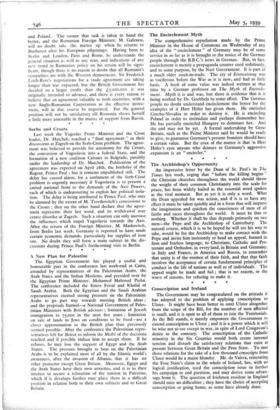A New Plan for Palestine The Egyptian Government has played
a useful and honourable part in the conference last week-end at Cairo, attended by representatives of the Palestinian Arabs, the Arab States and the Indian Moslems, and presided over by the Egyptian Prime Minister, Mohamed Mahmud Pasha. The conference included the Emirs Feisal and Khalid of Saudi Arabia. Both the Egyptian and the Saudi Arabian representatives exerted strong pressure on the Palestinian Arabs to go part way towards meeting British ideas ; and the proposals framed—a National Government of Pales- tinian Ministers with British advisers ; limitation of Jewish immigration to 75,000 in the next five years ; limitation on sale of lands to Jews on conditions to be fixed—are a closer approximation to the British plan than previously seemed possible. After the conference the Palestinian repre- sentatives left for Beirut to inform the Mufti of the decisions reached and if possible induce him to accept them. If he refuses, he may lose the support of Egypt and the Arab States. The pressure brought to bear on the Palestinian Arabs is to be explained most of all by the Islamic world's awareness, after the invasion of Albania, that it has no other protector except Great Britain. Moreover, Egypt and the Arab States have their own anxieties, and it is to their interest to secure a relaxation of the tension in Palestine, which if it develops further may place them in a difficult position in relation both to their own subjects and to Great Britain.














































 Previous page
Previous page